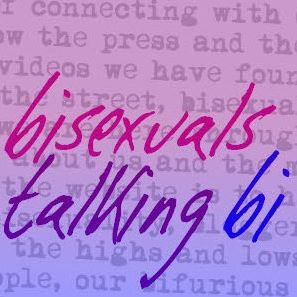In the
Scottish Daily Record this week (24th April, publication stamped
3pm though so perhaps online only) Nicole Heaney writes about how we live in terribly modern times where,
"having an attraction to the same sex in some eyes does not make you homosexual and it does not make you bisexual. Thus meaning you can be in a relationship with a female and be attracted to males but not necessarily be bisexual. The reason for this is because you could simply not envision yourself in a relationship with the same sex."
Woah there. This is a special redefining of bisexual to mean "attracted to more than one gender and interested in relationships with everyone to whom you are attracted".
Let's consider that "not really the sexuality in question" clause applied for gay or straight people: if you were, say, going out clubbing, pulling people and having casual sex seven nights a week, and happy with this and not wanting anything "more" in your life right now... you're just kidding yourself about having a sexuality at all. Hmmm. No. Those people are definitely gay or straight. Once you stop having a double-standard for bi, Nicole's definition of non-bi-bis comes unstuck quickly.
Then she turns to the future, which will be...
"A time when sexuality won’t be pigeon holed. A time where gay, straight, male or female will not matter and we will just have sex with whomever we are attracted to regardless of their status."
Uh-oh. We've seen this one before, haven't we? It's the same future fairytale with which Peter Tatchell invents bisexuality every couple of years without ever using the
B word. (I'm skipping over the lack in the original text of whether the other person is consenting. Subeditors can do terrible things to hone down a word count, after all).
I think it conflates two ideas, one which is useful, one which is not. Some day, yes, I hope whether you are bi, gay, straight or asexual won't matter: we won't need safe spaces as an escape from biphobia and so forth. That way that the first gay pubs I went to had blacked-out windows for the safety of patrons will be a long forgotten horror. If you find out someone fancies you, you'll only have to think:
do I fancy them back? Are we both single or otherwise available? Great! Let's do something about it then!The other idea, though, is the idea that when prejudice and queerbashing are behind us as a society, labels - bi, gay, straight - will no longer be needed. I think that's a duffer. Just because it's safe to
be bi or gay won't make all the people who never experienced same-sex attraction suddenly realise how attractive the people they never fancied before are. We'll still
be bi, gay, straight, asexual. We just won't be raised to beat ourselves up about it. And when someone turns you down because they just aren't into girls, they'll still need words that express that. Terms like bisexual may lose their loaded values, but they are still vital concepts about how humans and human sexuality work.
Then again, the Daily Record article begins by observing that
"It’s hard to believe that only some 20 years ago it was a crime to be homosexual". It is indeed. Not least because it wasn't - even though Section 28 had sought to make talking about it a thought-crime, homosexuality was decriminalised in Scotland in 1980, thirtyfive years ago.
We should probably have stopped reading there.

